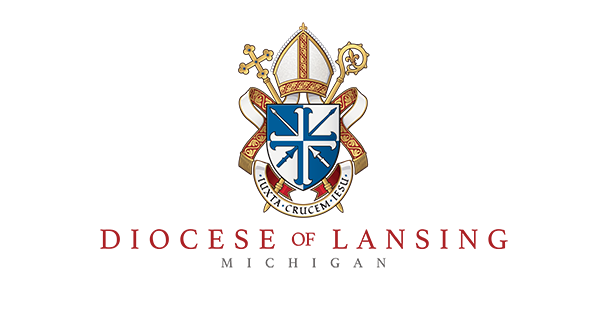The life, death and resurrection of Jesus Christ totally contradicts modern society’s often narcissistic notion of “love”, say Bishop Earl Boyea his latest editorial for FAITH Magazine, the official publication of the Diocese of Lansing.
“Today, too many of us have a strange view of love. Our first sense is that it is what gives me pleasure, what satisfies my needs, what helps me be fulfilled,” writes Bishop Boyea.
“Yet, if we are honest with ourselves, we will admit that such ‘love’ is never enough, it does not sate me, and it does not bring forth my true and better self.”
The contradiction and correction to that common viewpoint comes from Jesus Christ who points us towards true human happiness.
“Jesus shows us true love,” states Bishop Boyea, “Not only did he speak about it many times in his life here on earth, telling us that the seed must fall into the ground and die if it is to bear much fruit.”
“He lived and died this love. He sought what was for the true and lasting pleasure of others, of you and me; he responded to our real needs, to be freed of sin and death; and he showed us how to be who we are meant to be.”
“We are not meant to be narcissists; we are meant to give ourselves to others and for others.” Bishop Boyea’s Editorial is reproduced in full below:
Jesus Shows us True Love by Bishop Earl Boyea of Lansing, FAITH Magazine, May 2020:
“Christ Jesus, though he was in the form of God, did not regard equality with God something to be grasped.” Philippians 2:6
At every step of the way and after all the abuse Jesus endured, he did not grasp onto his divine nature and use it to protect himself. I think most of us would do everything in our power to escape what Jesus endured; we would not give our back to those who would beat us or our cheeks to those who would pluck our beards, as Isaiah says.
Instead of grasping onto his divinity, what did Jesus do? St. Paul tells us that he “emptied himself” – that he became a slave, that he took on our humanity, that he was obedient even to death and what is more, even to death on the cross.
This is what we “celebrate” during Holy Week. We honor, remember and celebrate that Jesus emptied himself, that he poured himself out for us, even to the point of that horrible death on the cross. Why did he do this? The only answer is love, a love that became most fruitful for us in the Resurrection on Easter Sunday.
Today, too many of us have a strange view of love. Our first sense is that it is what gives me pleasure, what satisfies my needs, what helps me be fulfilled. Yet, if we are honest with ourselves, we will admit that such “love” is never enough, it does not sate me, and it does not bring forth my true and better self.
Jesus shows us true love. Not only did he speak about it many times in his life here on earth, telling us that the seed must fall into the ground and die if it is to bear much fruit. He lived and died this love. He sought what was for the true and lasting pleasure of others, of you and me; he responded to our real needs, to be freed of sin and death; and he showed us how to be who we are meant to be. We are not meant to be narcissists; we are meant to give ourselves to others and for others.
We know that this comes at a cost. Look what it cost our Lord. He who was a great preacher and miracle worker came to be seen as a condemned man, guilty of blasphemy. That is really emptying oneself. That is love. That is why we call him Lord. This Easter season, as we meditate on the cross and on the tomb where he was laid, and on the empty tomb that first Easter Sunday morning – and as we meditate on the wounds which set us free – let us beg the Lord to send his Spirit to each of us in order that we may finally learn how to love.
To read more from FAITH Magazine, go to: faithmag.com. Image: El Greco (1541 – 1614), Christ Blessing, The Savior of the World.





